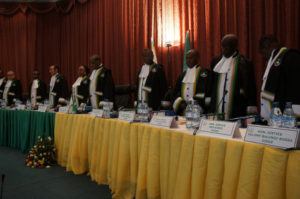By: Hannah Gabbard
Impunity Watch Reporter, Africa
ARUSHA, Tanzania – On May 11, 2018, the African Court of Human and Peoples’ Rights (AfCHPR) unanimously ruled that the United Republic of Tanzania did not violate George Maili Kemboge’s right to equality or the right to enjoy the best attainable state of mental and physical health pursuant to the African Charter on Human and Peoples’ Rights.

In August 2006, Kemboge was convicted by the District Court of Tarime for the rape of a fifteen year old girl. He was sentenced to thirty years in prison, twelve cane strokes, and a fine of five hundred thousand Tanzania Shillings.
In 2013 the High Court of Tanzania upheld the sentence and the Court of Appeal of Tanzania affirmed in 2014. Kemboge filed an appeal with the African Court of Human and Peoples’ Rights in 2016 alleging that his right to equal protection of the law and right to enjoy the best attainable state of physical and mental health had been violated. Kemboge appealed to the Court to quash the conviction and sentence and grant reparations.
On the merits, Kemboge argued that the Court of Appeal only considered procedural matters and did not consider the “interests of justice” and that equal protection of the law was violated. Kemboge presented three arguments he alleged the Court of Appeals did not consider. Here, the Court ruled that Kemboge’s allegation of a equal rights protection was dismissed because Kemboge did not demonstrate how the arguments were not properly raised before the lower courts.
Secondly, Kemboge alleged that his right to enjoy the best attainable state of physical and mental health was violated because he was not recognized as married to the victim. The Court ruled that state’s refusal to recognize an alleged marriage to the victim does not violate his right to enjoy the best attainable state of physical and mental health and therefore, dismissed the allegation.
The Court did not find any violation of rights and dismissed Kemboge’s appeal for reparations.
For further information, please see:
African Union – The Matter of George Maili Kemboge v. the United Republic of Tanzania – 11 May 2018
African Union – Executive Summary of the Application – 3 November 2015
